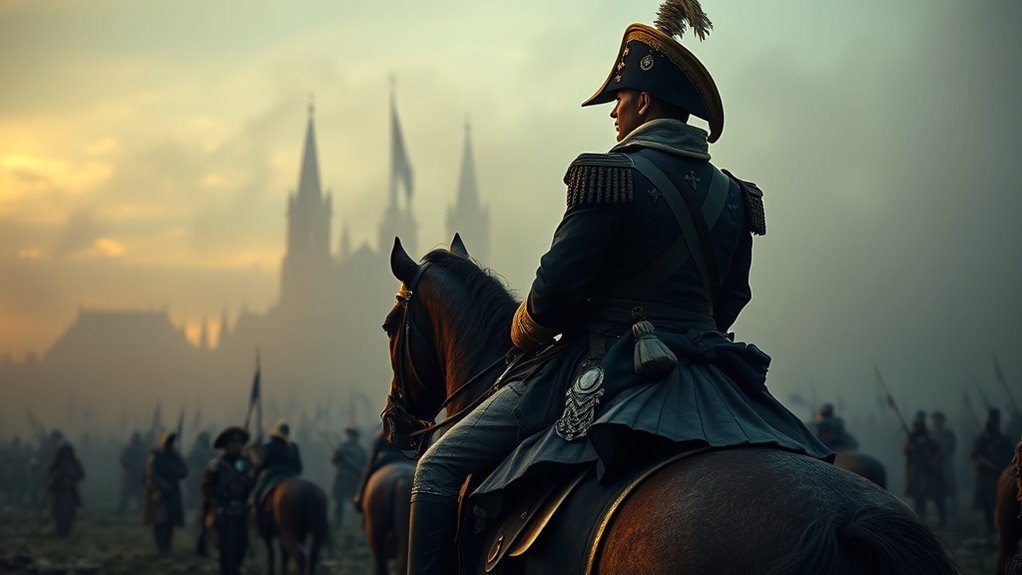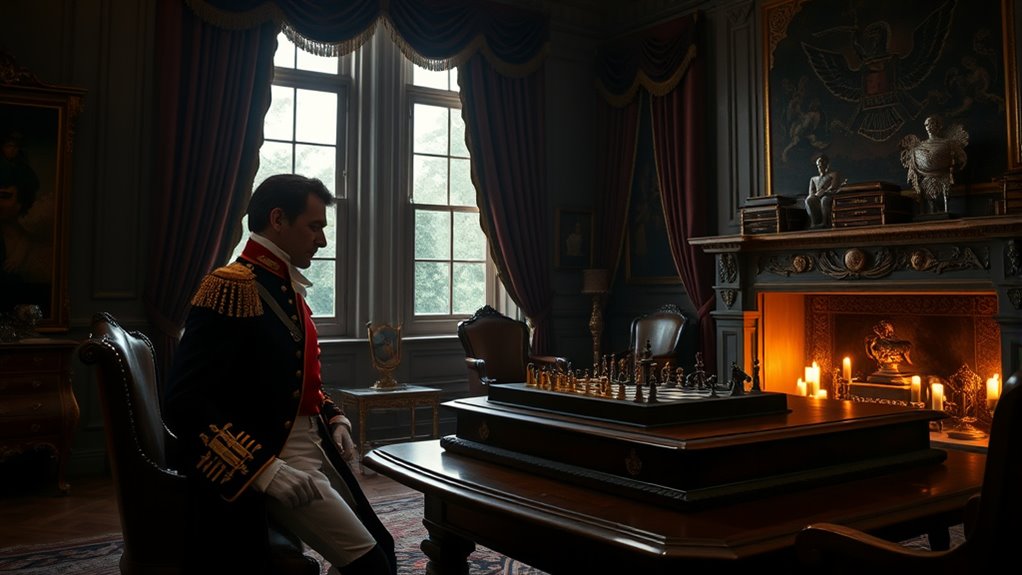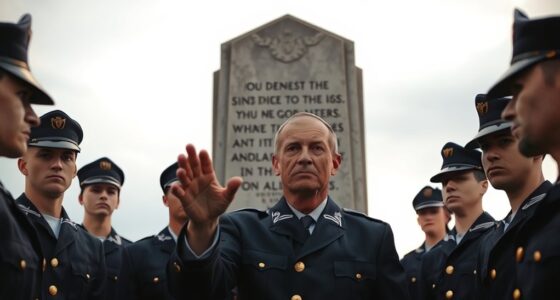Napoleon’s advice to “never interrupt your enemy when he is making a mistake” teaches you the value of patience and observation in strategy. Instead of rushing in, wait for your opponent to reveal their weaknesses through their errors. This approach allows you to act at the right moment, minimizing risk and maximizing impact. Mastering this restraint can give you an edge in leadership, negotiations, or conflicts—if you continue exploring, you’ll discover how timing can turn the tide in your favor.
Key Takeaways
- The quote highlights the strategic value of patience and observation during conflicts or competition.
- Napoleon used this principle to wait for opponents to reveal weaknesses before attacking.
- It emphasizes avoiding impulsive actions that could escalate conflicts unnecessarily.
- The strategy involves gathering intelligence and timing interventions for maximum impact.
- Applying this concept helps leaders and strategists capitalize on opponents’ errors effectively.

Napoleon Bonaparte’s quotes continue to inspire and challenge people today, revealing his sharp insights into leadership, strategy, and human nature. One of his most famous pieces of advice, “Never interrupt your enemy when he is making a mistake,” exemplifies his mastery of military strategy and leadership lessons. When you consider this quote, you’re reminded that patience and observation can be more powerful than impulsive interference. Napoleon understood that enemies often reveal their weaknesses through missteps, and by biding your time, you capitalize on their errors rather than wasting energy on unnecessary confrontation.
Patience and observation often outmatch impulsive action, revealing weaknesses at the right moment for strategic advantage.
In the domain of military strategy, this principle emphasizes the importance of strategic patience. Instead of rushing to exploit an enemy’s mistake immediately, you hold back, gathering intelligence and waiting for the ideal moment. This approach minimizes risks and maximizes your chances of success. Napoleon’s campaigns demonstrate this concept repeatedly; he would observe the enemy’s movements and hesitations, then strike with precision when the situation was most advantageous. It’s a lesson that applies beyond battlefields—whether you’re leading a team, managing projects, or steering competitive markets, patience often yields better results than rushing in prematurely.
From a leadership perspective, this quote underscores the importance of discipline and composure. As a leader, you must resist the temptation to react impulsively to every mistake your rivals or colleagues make. Instead, you learn to observe carefully, analyze the situation, and choose your moments wisely. This approach can help you maintain authority and avoid unnecessary conflicts, allowing you to conserve resources and focus on your long-term objectives. Napoleon’s ability to wait for the right opportunity was a key factor in his military success, and it’s a lesson any leader can adopt to improve decision-making and strategic thinking.
Furthermore, this quote reveals Napoleon’s deep understanding of human nature. He recognized that opponents often become their own worst enemies through arrogance, overconfidence, or hasty actions. By not interfering when they falter, you let their weaknesses surface naturally, giving you an advantage without direct confrontation. This insight teaches you to observe people’s behaviors and tendencies carefully, identifying moments when they are vulnerable. Whether in business or personal interactions, understanding when to hold back can be the difference between victory and defeat. Recognizing the importance of strategic patience can significantly improve your ability to navigate complex situations and make more effective decisions.
In essence, Napoleon’s advice about not interrupting your enemy when he makes a mistake is a timeless leadership lesson. It encourages patience, strategic restraint, and keen observation—traits that elevate your ability to lead effectively and execute military strategy with precision. Adopting this mindset helps you avoid unnecessary conflicts, capitalize on others’ errors, and position yourself for success in any challenge you face.
Frequently Asked Questions
How Did Napoleon Influence Modern Military Strategy?
You see, Napoleon revolutionized modern military strategy by emphasizing rapid movement and decisive actions. He mastered siege warfare and adaptively used guerrilla tactics to outmaneuver larger enemies. By inspiring swift, flexible responses, he taught you to exploit weaknesses and avoid overextending. His focus on strategic deception and concentration of forces continues to influence military thinking today, making him a pivotal figure in shaping contemporary warfare approaches.
What Were Napoleon’s Key Personal Traits?
You notice Napoleon’s key personal traits include a bold leadership style and strong personal resilience. His leadership style is strategic, inspiring loyalty and commanding respect, while his resilience helps him recover quickly from setbacks. You see his confidence and determination drive his military successes. His ability to adapt under pressure demonstrates his resilience, making him a formidable leader. These traits combined allowed him to influence history profoundly.
Did Napoleon Ever Regret Any Military Decision?
You might wonder if Napoleon ever felt regret over his military decisions. While he rarely admitted regret, history shows he made strategic errors, like the disastrous invasion of Russia. These regretful decisions led to significant losses and arguably altered his fate. Despite his confidence, some of his choices suggest he was aware of mistakes, but he rarely let regret influence his resolve to pursue his goals.
How Did Napoleon’s Tactics Evolve Over His Career?
You see, Napoleon’s tactics evolved considerably through his career. He embraced battlefield innovations like rapid maneuvers and centralized command, allowing him to adapt swiftly to changing circumstances. His strategic adaptations, from the bold use of artillery to flanking movements, kept him ahead of enemies. These tactical shifts reflect his keen ability to learn and improve, turning initial successes into lasting dominance on the battlefield.
What Is Napoleon’s Legacy Today?
You see Napoleon’s legacy today through his profound historical impact and cultural influence. His military strategies still shape modern warfare, and his legal reforms, like the Napoleonic Code, influence legal systems worldwide. You might also notice his image in art, literature, and national identities, symbolizing power and ambition. His life reminds you of how leadership, innovation, and strategic thinking leave lasting marks on history and culture.
Conclusion
Remember, Napoleon’s wisdom reminds you to wait for your moment. Did you know that over 60% of successful leaders say patience and strategic silence gave them an edge? By not interrupting your enemy when they’re making a mistake, you gain valuable insight and control. So, next time you’re in a tough spot, stay calm and watch them falter. Sometimes, silence is your most powerful weapon—just like Napoleon advised.
Joy, as our Editor in Chief, ensures the highest standard of content. Her talent in writing is complemented by her attention to detail and passion for literature and culture. Joy’s expertise and love for the English language shine through in her editorial work, making each piece a testament to quality and clarity.









